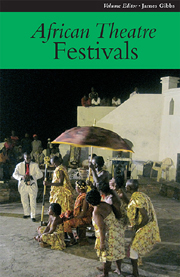Book contents
- Frontmatter
- Contents
- Notes on Contributors
- Obituary of Efo Kodjo Mawugbe
- Introduction by James Gibbs
- Festivals as a Strategy for the Development of Theatre in Zimbabwe 1980–2010
- The Legacy of Festac '77
- Festac, Month by Month & Soyinka's Involvement
- The Dakar Festivals of 1966 & 2010
- African Renaissance between Rhetoric 30 & the Aesthetics of Extravagance FESMAN 2010 – Entrapped in Textuality
- Theatre Programme for FESMAN & Commentary
- The Pan-African Historical Theatre Festival (PANAFEST) in Ghana, 1992–2010
- PANAFEST through the Headlines
- International Festivals & Transnational Theatre Circuits in Egypt, 1988–2010
- The Jos Theatre Festival 2004–2011
- The Grahamstown Festival & the Making of a Dramatist An interview with ANDREW BUCKLAND
- Playscript
- Book Reviews
International Festivals & Transnational Theatre Circuits in Egypt, 1988–2010
Ambassadors of no nation
Published online by Cambridge University Press: 05 May 2013
- Frontmatter
- Contents
- Notes on Contributors
- Obituary of Efo Kodjo Mawugbe
- Introduction by James Gibbs
- Festivals as a Strategy for the Development of Theatre in Zimbabwe 1980–2010
- The Legacy of Festac '77
- Festac, Month by Month & Soyinka's Involvement
- The Dakar Festivals of 1966 & 2010
- African Renaissance between Rhetoric 30 & the Aesthetics of Extravagance FESMAN 2010 – Entrapped in Textuality
- Theatre Programme for FESMAN & Commentary
- The Pan-African Historical Theatre Festival (PANAFEST) in Ghana, 1992–2010
- PANAFEST through the Headlines
- International Festivals & Transnational Theatre Circuits in Egypt, 1988–2010
- The Jos Theatre Festival 2004–2011
- The Grahamstown Festival & the Making of a Dramatist An interview with ANDREW BUCKLAND
- Playscript
- Book Reviews
Summary
Egypt's former Minister of Culture, Farouk Hosni, inaugurated the Cairo International Festival for Experimental Theatre (CIFTET) in 1988, when Hosni Mubarak's regime had launched a wave of reforms aimed at globalising the national economy in accordance with International Monetary Fund guidelines. As imported commodities began to pour into Egypt in greater volume, and as satellite television channels brought in foreign genres, state officials sought pre-emptively to define the future of national culture in an era of economic globalisation. The word al-thaqafa (culture) had connoted high culture in Arabic, and the Ministry of Culture had traditionally subsidised literature and art as well as the theatre, that, in the European sense, had gained prestige as a result of Ottoman and British rule. Together with other Western art forms, it had entered the Egyptian cultural canon, and during the 20th century, Egyptian theatre grew robustly. It prospered particularly during periods when state theatres fostered playwriting and subsidised ticket prices. During the 1960s and 70s, state cultural institutions also sponsored playwrights and directors to study abroad, and commissioned a significant number of translations. Intellectual exchange with Eastern Europe, the Soviet Union, and Britain made for a varied theatre that conducted a dialogue with international trends. However, according to Farouk Hosni, appointed by a regime initiating neo-liberal reforms, the new period of globalisation called for a new style of international theatre.
- Type
- Chapter
- Information
- African Theatre 11: Festivals , pp. 68 - 74Publisher: Boydell & BrewerPrint publication year: 2012



